4 Collagen Added Benefits: The Complete Supplement for Skin, Joints, and Muscle Gain
Table of Contents
Have you ever wondered why so many people are adding collagen to their daily routine? If you’re looking for younger-looking skin, healthier joints, or enhanced muscle recovery, collagen with added benefits might be the ally you’ve been searching for. In this comprehensive guide, we’ll explore how this powerful supplement works simultaneously to improve your external appearance while strengthening your body from within.
The collagen supplement market has grown exponentially in recent years, with products specifically formulated to address different needs. Whether in powder form or gummies, modern supplements go far beyond the basic protein, incorporating nutrients that enhance their effects on skin, joints, and muscles.
Let’s discover together why it has become indispensable for those seeking complete health and wellness, unveiling the secrets behind this versatile supplement and how to choose the best option for your specific needs.
What Is Collagen and Why Is It So Important?
Collagen is the most abundant protein in our body, making up about 30% of all proteins present. Think of it as the “cement” that holds our cells together, providing structure, strength, and elasticity to various tissues. It’s present in skin, cartilage, bones, tendons, ligaments, and even blood vessels.
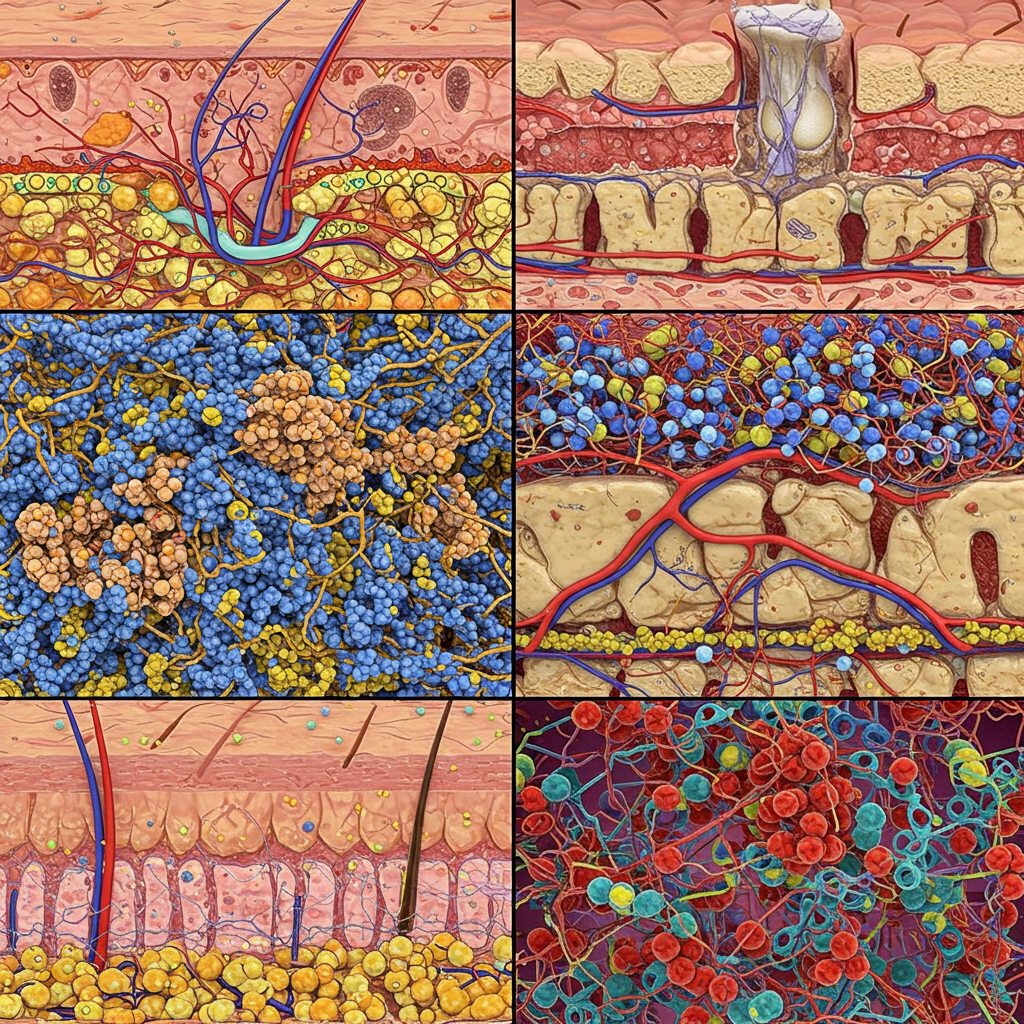
The Structure of Collagen and Its Function in the Body
It’s structure is fascinating and explains why it’s so fundamental to our organism. It’s formed by three amino acid chains (mainly glycine, proline, and hydroxyproline) that intertwine in a triple helix, creating extremely strong and resistant fibers.
In the human body, these fibers form networks that support tissues, allowing them to resist stretching. In the skin, for example, it forms a network in the dermis that provides firmness and elasticity. In joints, it makes up the cartilage that protects bones and allows for smooth movement. In muscles, it helps structure fibers and contributes to their recovery after exercise.
It also plays a crucial role in healing, forming the basis for tissue repair when injuries occur. Without adequate levels of this protein, our body would literally begin to “fall apart.”
Read more about tissue repair and collagen in this article: Click here.
How Collagen Production Decreases with Age
Here’s information many would prefer not to know: starting from ages 25-30, our body begins to produce less collagen, with a decrease rate of approximately 1-1.5% per year. By the time we reach 50, we may have lost up to 30% of the it in our body!
This natural reduction is impacted by several factors:
- Chronological aging: Cells that produce collagen (fibroblasts) become less efficient over time.
- Sun exposure: UV radiation degrades collagen fibers and impairs their synthesis.
- Oxidative stress: Free radicals damage existing collagen structures.
- Poor diet: Lack of vitamin C, zinc, and other essential cofactors for its production.
- Smoking and alcohol: Both accelerate its degradation and inhibit its synthesis.
The signs of this progressive loss are visible: wrinkles and sagging skin, joint pain, slower muscle recovery, and even digestive problems. It’s in this scenario that collagen supplementation gains prominence as a strategy to compensate for this natural deficiency.
Benefits of Collagen for the Skin
When we think about collagen, the first benefit that usually comes to mind is its effect on the skin. It’s no wonder it has become the darling of the cosmetic and beauty supplement industry.
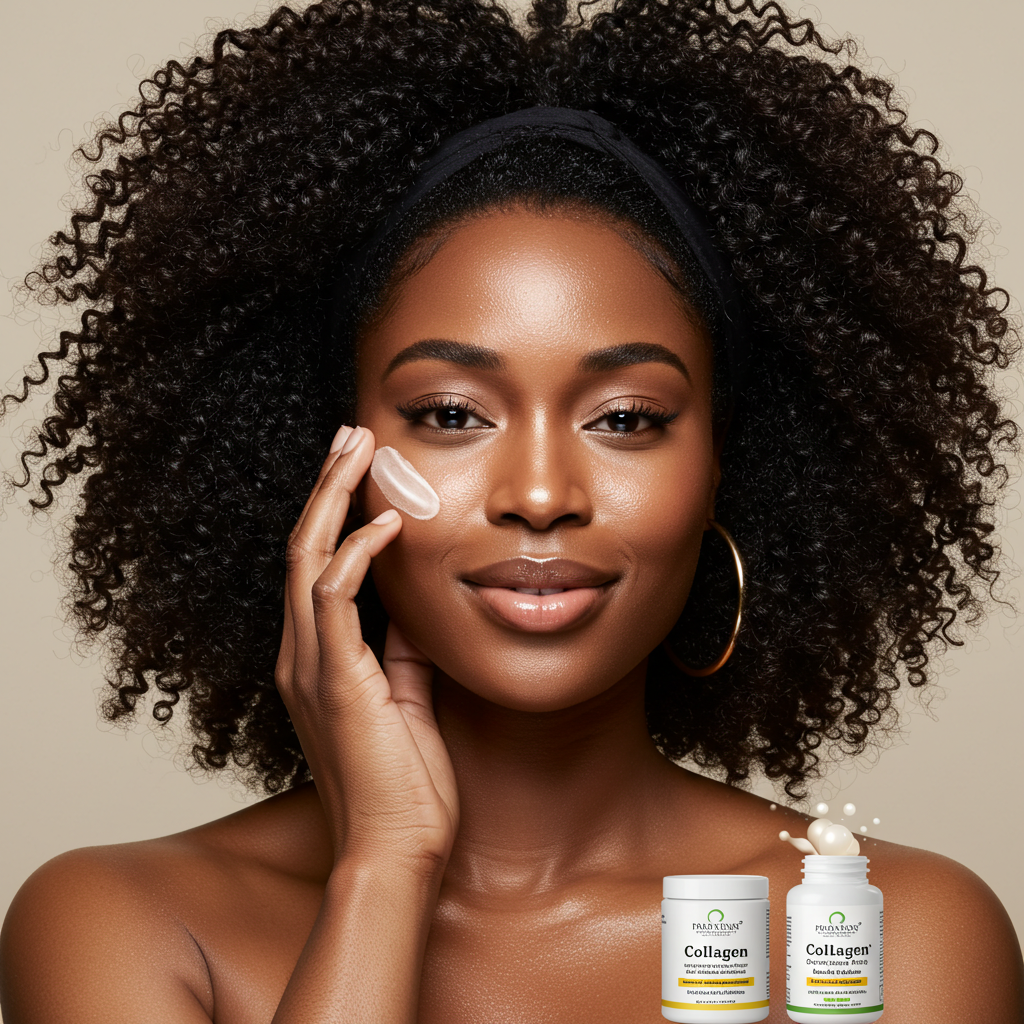
How Collagen Improves Skin Elasticity
Skin elasticity—that ability to stretch and return to normal—depends directly on the quality and quantity of its present in the dermis. The collagen peptides ingested through supplementation are absorbed in the intestine and distributed throughout the body, where they stimulate fibroblasts (collagen-producing cells) to work more efficiently.
By regularly consuming collagen supplements, you provide your body with the building blocks necessary to maintain skin structure. The result is firmer skin that “responds” better when pressed, quickly returning to its original position.
An interesting aspect is that it also helps with skin hydration, increasing its ability to retain water. Well-hydrated skin naturally appears more elastic and vibrant. Many modern supplements combine collagen with hyaluronic acid for exactly this reason, enhancing the hydrating effect.
Reduction of Wrinkles and Fine Lines
Wrinkles and expression lines are essentially the result of weakened collagen structures in the skin. When we supplement with hydrolyzed type (broken down into smaller peptides for better absorption), we provide the body with materials to “repair” these weaknesses.

The process works in two ways:
- Collagen peptides act as building blocks directly used to create new fibers.
- These same peptides function as signalers, stimulating cells to produce more collagen, elastin, and other structural proteins.
Over time, this dual action results in natural filling of wrinkles from within, especially fine lines that are the first signs of aging. The skin gains volume, wrinkles become less pronounced, and texture significantly improves.
Scientific Studies that Prove the Results
It’s effectiveness for the skin isn’t just marketing—there are several scientific studies that prove its benefits:
- Research published in the Journal of Medical Nutrition & Nutraceuticals showed that women who consumed 2.5g of hydrolyzed collagen daily for 8 weeks showed significant improvement in skin elasticity and reduction in wrinkle depth compared to the placebo group.
- Another study, published in the Journal of Cosmetic Dermatology, demonstrated that ingestion of this peptides for 12 weeks significantly increased skin hydration and reduced dermal collagen fragmentation.
- A systematic review of 11 studies with more than 800 participants concluded that the supplements improve skin elasticity and hydration, as well as increase its density.
It’s important to note that results aren’t instantaneous. Most studies point to visible improvements after 4-12 weeks of consistent supplementation. As with any health investment, patience and regularity are essential to observe the full benefits.
Collagen for Joint Health
Beyond aesthetic benefits, it plays a fundamental role in joint health. If you suffer from joint discomfort or seek to prevent future problems, this is an aspect that deserves your attention.
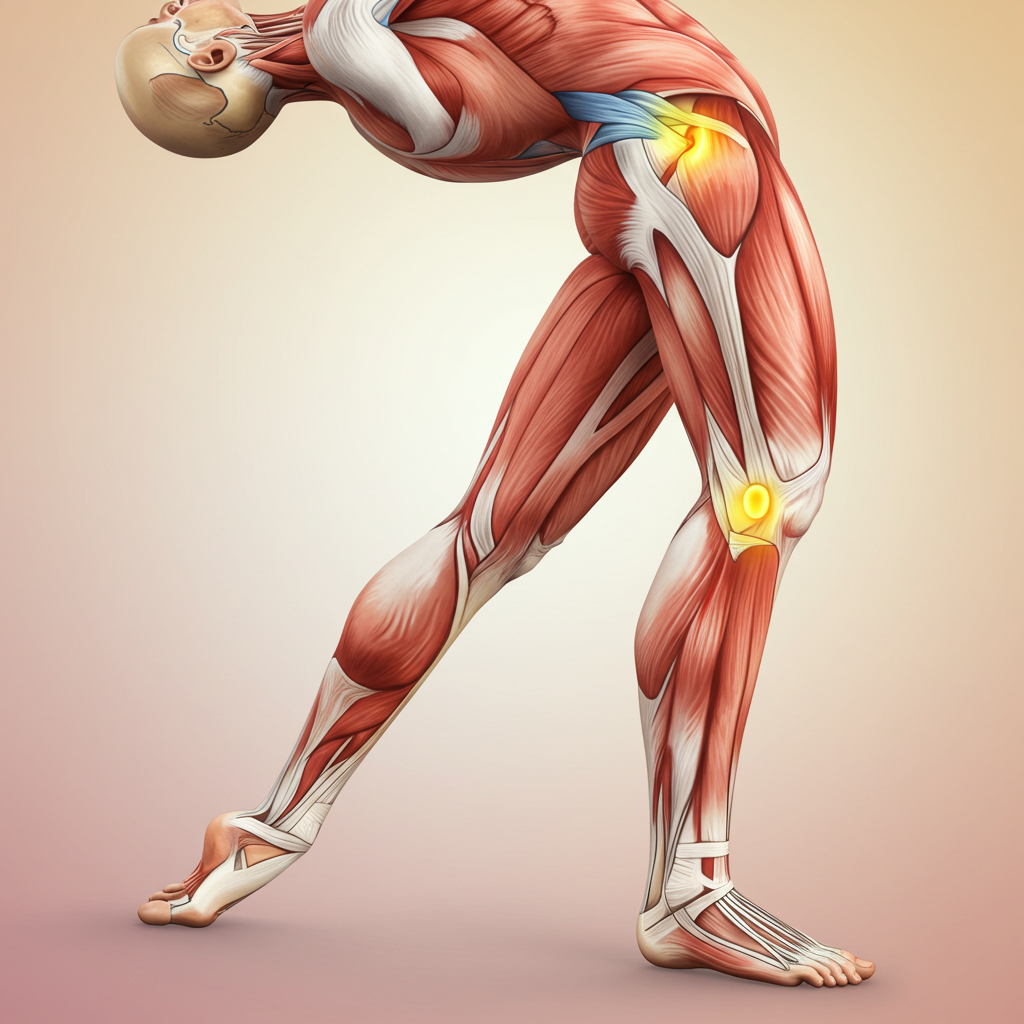
Relief of Pain and Inflammation in the Joints
Joints are points where two or more bones meet, allowing movement. For this movement to occur without friction and pain, the bone extremities are covered by cartilage, a tissue consisting mainly of type II collagen.
With aging and natural wear, this cartilage can deteriorate, resulting in conditions such as osteoarthritis, characterized by pain, stiffness, and inflammation. This is where supplementation comes into play:
- Hydrolyzed collagen provides the amino acids necessary to repair and maintain the integrity of articular cartilage.
- Bioactive peptides help reduce inflammation through modulation of inflammatory cytokines.
- Regular supplementation can slow down cartilage degradation and stimulate the synthesis of new cartilaginous matrix.
Many users report significant reduction in joint pain after a few weeks of regular its supplementation. In particular, formulations that combine type II (specific for cartilage) with anti-inflammatory ingredients such as turmeric or ginger have shown even more promising results.
Improvement of Mobility and Flexibility
Besides relieving pain, it directly contributes to joint mobility and flexibility. This happens because:
- Well-nourished cartilage with collagen functions as a more efficient shock absorber between bones, allowing for smoother movements.
- It also strengthens ligaments and tendons, which are responsible for keeping joints aligned and stable.
- Better hydration of cartilage, provided by collagen, increases its ability to absorb impacts.
The result is the ability to move more easily and with less discomfort. Many people notice that activities that were previously painful, such as climbing stairs or squatting, become progressively easier after starting supplementation.
Benefits for Athletes and Active Individuals
For those who regularly engage in physical activities, collagen offers specific benefits:
- Faster recovery: It helps repair micro-damage to joints caused by exercise impact.
- Injury prevention: Stronger and well-nourished joints are less prone to injury during sports practice.
- Greater sports longevity: By preserving joint health, it’s possible to stay active longer.
It’s not surprising that many professional athletes have incorporated collagen into their supplementation routine. Studies with collegiate basketball players showed that those who consumed hydrolyzed collagen experienced less knee pain both at rest and during activities compared to the control group.
The benefits also extend to recreational athletes and people who simply wish to maintain an active lifestyle as they age. Collagen’s ability to protect joints from natural wear makes it a valuable preventive supplement, even for those who don’t yet have joint problems.
Collagen and Muscle Gain
A less known but equally important aspect is collagen’s role in muscle development and recovery. While proteins traditionally associated with muscle gain are whey and casein, collagen offers unique benefits that perfectly complement a hypertrophy strategy.

How Collagen Assists in Muscle Recovery
Strength training causes micro-tears in muscle fibers, which then regenerate stronger—this is the basic principle of hypertrophy. What many don’t know is that collagen is essential in this recovery process:
- It forms the connective tissue that surrounds muscle fibers (endomysium, perimysium, and epimysium), providing structure and support.
- During post-workout recovery, it helps repair not just muscle tissue, but also tendons and ligaments that are equally stressed during exercise.
- Glycine, one of it’s main amino acids, is involved in the synthesis of creatine, which in turn provides energy for muscle contraction.
Studies show that athletes who supplement with it report less delayed onset muscle soreness (the pain that appears 24-48 hours after training) and can return to training with intensity more quickly. This allows for higher frequency and quality of workouts, leading to superior long-term results.
Synergies Between Collagen and Proteins for Hypertrophy
It’s important to understand that collagen doesn’t replace other proteins in the hypertrophy process—it complements them synergistically. While proteins like whey are rich in branched-chain amino acids (BCAAs) that directly stimulate muscle protein synthesis, collagen provides:
- Specific amino acids such as glycine, proline, and hydroxyproline, which are less abundant in other protein sources.
- Structural support for muscle growth, ensuring that muscles not only grow but do so in a functional way with lower risk of injury.
- Improvement in sleep quality through glycine, optimizing recovery and growth hormone release, essential for hypertrophy.
The ideal combination involves consuming complete proteins (like whey) after training to stimulate muscle protein synthesis, and adding collagen at other times of the day for structural support and recovery. This holistic approach results in more sustainable muscle gains and lower risk of injuries during the process.
Effective Combinations with Other Supplements
The benefits of it for muscle gain can be enhanced when strategically combined with other supplements:
- + Vitamin C: Vitamin C is essential for collagen synthesis in the body. Many formulations already include this vitamin, but ensuring its presence optimizes results.
- + Creatine: Creatine increases strength and endurance during workouts, while collagen improves recovery—a powerful combination for hypertrophy.
- + Pea Protein: For those who don’t consume animal proteins, pea protein well complements the amino acid profile of vegan (derived from yeast).
Timing also matters. Research suggests that consuming it approximately 30-60 minutes before physical activity, along with vitamin C, can direct peptides specifically to tissues that will be exercised, maximizing their benefits.
For endurance athletes, combining it with electrolytes can aid in recovery from long workouts, while for strength training practitioners, adding collagen to post-workout shakes containing carbohydrates and proteins optimizes the anabolic environment.
Forms of Collagen Supplementation
With the growing popularity of collagen, the market offers various supplementation options. Each format has its advantages and may better suit different lifestyles and needs.
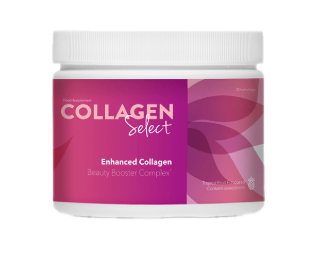
Read more abou this recommended collagen supplement: Collagen select
Collagen Powders: Versatility and Absorption
Powder supplements are the most common and versatile form on the market. Generally presented as hydrolyzed ( peptides), they offer excellent bioavailability, being easily absorbed by the body.
The advantages of powders include:
- Ease of dosing: You can adjust the exact amount according to your needs.
- Versatility of use: Can be added to various beverages and foods such as coffee, juices, smoothies, yogurts, and even recipes.
- Cost-effectiveness: Generally offer more doses per package compared to other formats.
- Superior absorption: Its peptides in powder are designed for maximum intestinal absorption.
Many brands offer unflavored versions, which don’t alter the taste of your preferred beverage or food. There are also options flavored with chocolate, berries, vanilla, and other flavors that make consumption more enjoyable when mixed just with water.
To maximize benefits, it’s recommended to consume powder with some source of vitamin C to enhance its absorption. A glass of natural orange juice or a few drops of lemon with water is sufficient for this purpose.
Collagen Gummies: Convenience and Taste
Gummies emerged as a convenient and tasty alternative to traditional powders. They’ve especially won over those seeking practicality or who have difficulty consuming powder supplements.
Among the main benefits of gummies are:
- Convenience: They require no preparation, ideal for consumption while traveling or at work.
- Pleasant taste: They usually have fruity flavors that make consumption more enjoyable.
- Ready dosage: Each gummy contains a pre-determined amount of collagen, facilitating intake control.
- Addition of other nutrients: Many gummies combine collagen with vitamins, minerals, and other beneficial compounds in a single formulation.
It’s worth noting that gummies generally contain less of it per serving compared to powders (typically 2.5-5g vs. 10g in powders). This means you may need to consume more units to achieve the same dosage. Additionally, some formulations contain sugar or artificial sweeteners, which should be considered by those monitoring their intake of these components.
Gummies are particularly popular among people who:
- Have a busy schedule and need on-the-go options
- Don’t like the texture or idea of mixing powders in liquids
- Prefer an experience more like a “snack” than a supplement
How to Choose the Best Format for Your Needs
The choice between powders, gummies, or other formats should consider various personal factors:
Consider powders if you:
- Seek cost-effectiveness
- Prefer larger doses (typically 10g per serving)
- Already have the habit of preparing shakes or smoothies
- Want flexibility in dosage
- Prefer versions with fewer additives
Opt for gummies if you:
- Value convenience above all
- Have difficulty adhering to traditional supplements
- Don’t mind consuming a smaller amount per serving
- Appreciate a more enjoyable consumption experience
- Need options that don’t require refrigeration or preparation
Regardless of the chosen format, consistency is most important. It needs to be consumed daily to show significant results. Therefore, choose the format that best adapts to your lifestyle and that you can incorporate into your routine in a sustainable way.
How to Choose the Ideal Supplement
With so many options available on the market, choosing the ideal supplement may seem like a daunting task. Let’s explore the most important factors you should consider to make the best choice for your specific needs.

Types and Their Specific Functions
There are at least 28 different types of collagen in the human body, but types I, II, and III represent about 90% of the total. Each type has specific functions, and supplements can be formulated to meet different needs:
Type I :
- Represents about 90% of the body’s collagen
- Main component of skin, hair, nails, bones, and tendons
- Ideal for: improving skin elasticity, strengthening nails and hair, bone health
- Common source: bovine, marine (fish)
Type II :
- Present mainly in cartilage
- Composed of finer fibers, specific for joints
- Ideal for: joint health, osteoarthritis pain relief, sports recovery
- Common source: chicken (especially sternum and tracheal cartilage)
Type III:
- Found in reticular tissues such as blood vessels, skin, and muscles
- Often works in conjunction with Type I
- Ideal for: cardiovascular health, skin elasticity, muscle recovery
- Common source: bovine
Some supplements contain only one specific type of it, while others offer “multi-collagen” formulas that combine different types. The choice depends on your main goal:
- For a focus on beauty (skin, hair, nails): Prioritize Types I and III
- For joint health: Prioritize Type II
- For a general health approach: Consider multi-collagen formulas
Additional Ingredients that Enhance Results
Modern supplements go far beyond the basic protein. Many include additional ingredients that enhance results in specific areas:
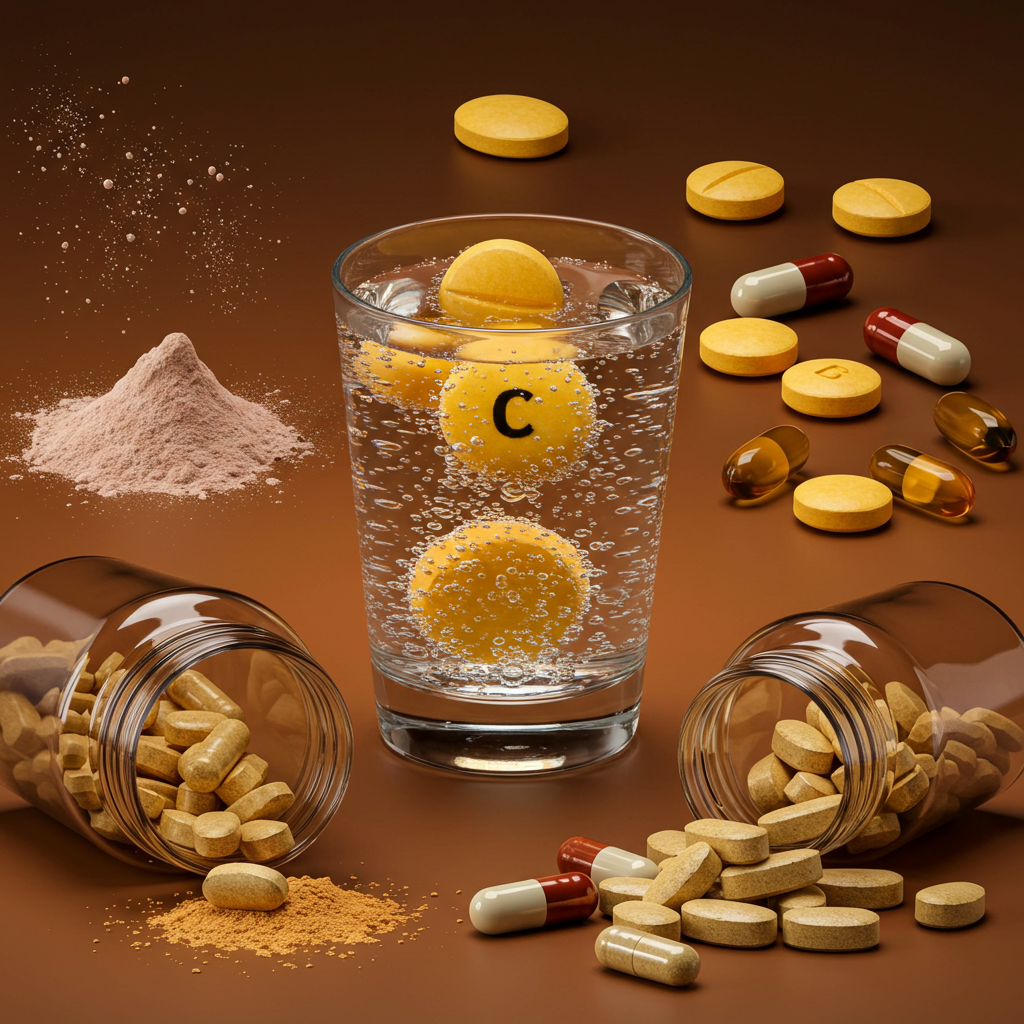
For skin benefits:
- Hyaluronic acid: Increases skin hydration and volume
- Vitamin C: Essential for synthesis
- Biotin: Strengthens hair and nails
- Antioxidants like resveratrol: Protect against damage that degrades collagen
For joint health:
- Chondroitin and glucosamine: Complement collagen’s action in cartilage
- MSM (methylsulfonylmethane): Reduces inflammation and joint pain
- Turmeric/curcumin: Powerful natural anti-inflammatory
- Boswellia serrata: Helps preserve cartilage and reduce pain
For muscle recovery:
- BCAAs: Complement the amino acid profile for protein synthesis
- Magnesium: Assists in muscle function and reduces cramps
- L-glutamine: Accelerates muscle recovery
- B-complex vitamins: Participate in energy metabolism
These strategic combinations can offer superior results compared to isolated collagen. However, it’s important to check the dosages of these additional ingredients—some formulas include only symbolic amounts that don’t offer real benefits.
Read more about a collagen supplement with additional ingredients: Click here
Certifications and Product Quality
The quality of these supplements can vary significantly between brands. Here are some quality indicators you should look for:
Origin and procurement process:
- from grass-fed animals for bovine sources
- Sustainable fishing for marine
- Extraction processes that preserve peptide integrity
Certifications and testing:
- Good Manufacturing Practices (GMP) certification
- Third-party testing for contaminants and purity
- Non-GMO and/or organic certification (if important to you)
- Certification of allergen absence (gluten, dairy, etc.)
Transparency:
- Clear information about the type used
- Full disclosure of peptide molecular weight (ideally between 2-5 kDa for better absorption)
- Detailed breakdown of exact amounts of active ingredients (not just “proprietary blend”)
Additional considerations:
- For those with dietary restrictions, there are alternatives to animal collagen, such as silicon-based supplements or plant-derived collagen stimulators
- If you’re vegetarian/vegan, look for “vegan collagen peptides” (technically they don’t contain collagen, but provide precursors for its production)
- Consider the brand’s history and consumer reviews
Remember that the most expensive supplement isn’t always the best. Price should be evaluated along with ingredient quality, collagen concentration per dose, and the presence of beneficial additives in effective dosages.
Conclusion
Collagen with added benefits represents a significant evolution in the field of nutritional supplementation. Far from being just another passing fad, modern c supplements offer a multifaceted approach to health, working simultaneously to improve skin appearance, strengthen joints, and optimize muscle recovery.
What makes it truly special is its versatility and compatibility with different health goals. Whether you’re an athlete seeking faster recovery, someone with joint discomfort, or simply a person looking to maintain a youthful appearance for longer, there’s a formulation that can meet your specific needs.
The science behind it’s benefits continues to evolve, with new studies regularly confirming its positive effects and discovering new mechanisms of action. The industry, in turn, responds with increasingly specific and effective products, combining it with synergistic ingredients that enhance its natural benefits.
As with any supplementation, consistency is crucial. The most impressive results are observed after weeks or months of regular use, when the body has enough time to utilize its peptides in rebuilding and strengthening tissues.
Finally, remember that collagen supplementation works best as part of a holistic health approach, which includes balanced nutrition, adequate hydration, quality sleep, and regular exercise. When combined with these healthy habits, collagen can truly transform your health and well-being from the inside out.
FAQ: Frequently Asked Questions About Collagen Supplementation
1. What is the best time of day to take it?
There’s no scientifically proven “ideal” time to take collagen. The most important thing is daily consistency. That said, many people prefer taking it in the morning with breakfast or coffee, while others find it beneficial before bed to support overnight recovery. Some research suggests taking it about 30-60 minutes before exercise may help direct peptides to active tissues.
2. How long does it take to see results from collagen supplements?
Results timeline varies depending on your goals:
- Skin benefits: Most people notice improvements in hydration within 4-8 weeks, with more significant changes in elasticity and wrinkle reduction after 8-12 weeks of consistent use.
- Joint benefits: Pain reduction and improved mobility typically begin around 6 weeks, with continued improvement over 3-6 months.
- Muscle recovery: Enhanced recovery can be noticed within 1-2 weeks of consistent supplementation.
Remember that individual results may vary based on age, overall health, and dosage.
3. Can collagen supplements help with weight loss?
While it isn’t primarily a weight loss supplement, it may indirectly support weight management in several ways:
- Increased protein intake can enhance satiety and reduce overall calorie consumption.
- Improved joint health may make exercising more comfortable, allowing for more consistent physical activity.
- Glycine in collagen supports healthy metabolism and may help maintain lean muscle mass during calorie restriction.
However, collagen should be part of a comprehensive approach to weight management that includes healthy eating and regular exercise.
4. Are there any side effects to taking collagen supplements?
Most people tolerate collagen supplements very well. Occasional mild side effects might include:
- Feeling of fullness or mild digestive discomfort
- Slight taste lingering in the mouth (with unflavored products)
- Mild heartburn in some sensitive individuals
To minimize potential digestive issues, start with a lower dose and gradually increase. Taking collagen with food rather than on an empty stomach can also help. If you have food allergies, be sure to check the source of the collagen (bovine, marine, chicken) to avoid allergenic sources.
5. Can vegans and vegetarians benefit from collagen supplements?
Traditional these supplements are derived from animal sources (bovine, marine, chicken), making them unsuitable for vegans and vegetarians. However, there are alternatives:
- “Vegan builders” containing plant-based nutrients that support your body’s natural production (vitamin C, zinc, silica, amino acids)
- Plant-based supplements with similar benefits, such as bamboo extract (high in silica)
- Fermented-technology derived “vegan” made by programming yeast and bacteria to produce collagen-identical proteins
These alternatives can provide many of the same benefits by supporting your body’s own collagen synthesis rather than directly supplying animal-derived collagen.

